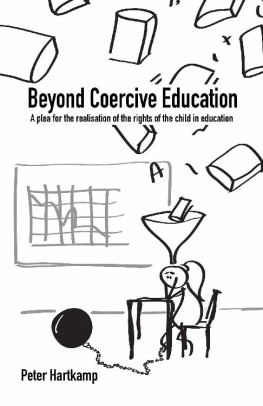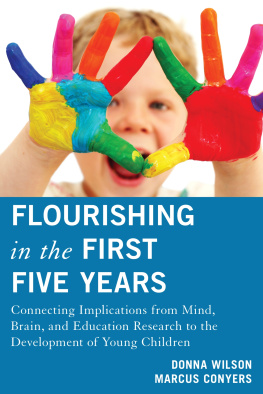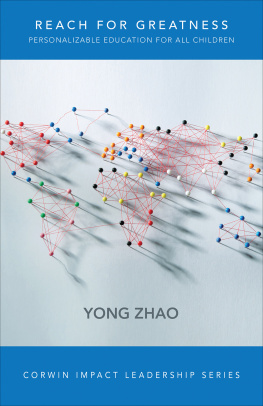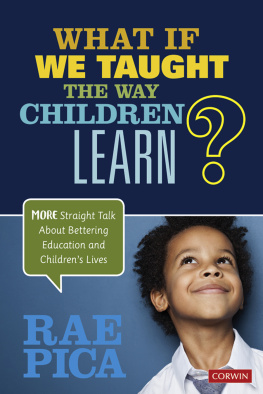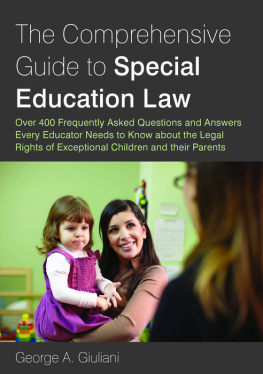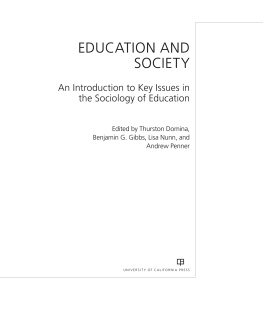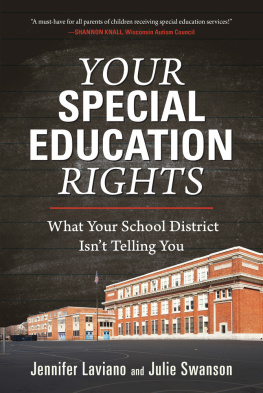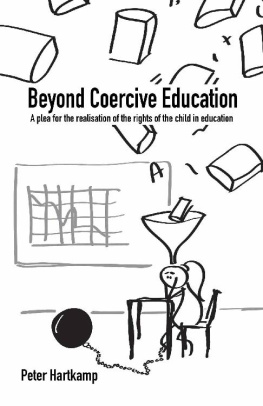Beyond Coercive Education
A plea for the realisation of the rights of the child in education
Peter Hartkamp
Original title
Het gedwongen onderwijs voorbij
Peter Hartkamp 2016
Translated and edited by
Peter Hartkamp
Layout
Christel Hartkamp-Bakker
Cover design & illustrations
Liselotte Hartkamp
(The illustration in myth 5 is inspired by a cartoon without identifiable rights based on a quote by A. Einstein).
peter@hetgedwongenonderwijsvoorbij.nl
www.beyondcoerciveeducation.eu
www.facebook.com/beyondcoerciveeducation/
Publisher: The Quantum Company
Paperback ISBN 978-90-825641-1-2
NUR 840
2016 Peter Hartkamp - The Quantum Company
All rights reserved. No part of this book may be reproduced in any matter whatsoever without written permission except in the case of brief quotations with reference. For information, address The Quantum Company, Oranjelaan 10, 3818 GR Amersfoort, the Netherlands
To Willemijn, Birgit en Liselotte
Recommended by:
Peter Gray , research professor of developmental and evolutionary psychology at Boston College and author of Free to Learn: Why Releasing the Instinct to Play Will Make Our Children Happier, More Self-Reliant, and Better Students for Life.
Peter Hartkamp is one of my heroes. He has, for many years, been struggling to make truly democratic education--education that respects the dignity, humanity, intelligence, and amazing natural learning drives and capacities of children--legal in the Netherlands. In this book he pulls the rug from beneath the shaky intellectual edifices that have been constructed by defenders of the educational status quo, and we see them topple. Hartkamp is not a wishful-thinking sentimentalist; he's a clear-thinking realist, with an engineering background, who brings that clear thought to an analysis of how we have become culturally trapped by an ineffective, inhumane educational system and how we can escape that trap. I recommend this book to everyone who cares about children or about the future of humanity.
Contents
Foreword
'I WOULD RATHER BE DEAD THAN AT SCHOOL said our daughter when she was eight years old. She had already indicated that she was not very enthusiastic about school, but never so clearly. In contrast, during the summer holidays, we saw an energetic and curious child, until the last week of the holidays when she became depressed again. This went on until the next summer holidays. When she said she would rather be dead, this was a big wake-up call for us.
Our response was that this cannot be the purpose of school. So we tried to find out what exactly happened at the school that made it so awful. Socially our daughter was doing well. She had many friends and enjoyed herself. It was the schooling itself that was awful. The school did not meet her learning needs in any way. The result was that my partner and I have been working in education continuously since 2000.
Our daughter attended a school where children were relatively free to determine what to do. But those choices appeared to be limited to the order in which she was allowed to do her schoolwork. As it turned out, the choice of what to do did not exist. We spoke to many parents who also experienced problems with schooling. These were parents with children in traditional schools, a Montessori school and a Waldorf school. It struck us that all the problems were the same. Our conclusion was that the problems were not caused by the type of school, but by the school system itself. That was a bit of a difficult conclusion, as outside the state-funded school system there was not much else. At the same time, we as parents were forced by the government to send our children to school.
The only option left, was to set up a school outside the (state-funded) system. This is easier said than done. Firstly, because starting a school is quite difficult and secondly because we both had no experience in education, except from our own school time.
So we started a long search and we looked into concepts such as flow in learning, motivation theories, demand-driven learning and child-centred education. However, with all educational models we encountered, it still remained the adults who ultimately decided what children did. Finally, we discovered the Sudbury Valley School, near Boston. Here, children determine themselves what they do and, in addition, they also control the management of the school, along with the staff members. I still remember the first time I looked at their website. My first reaction was, 'No, thats impossible. A few weeks later I looked again, then a little longer. Still I was far from convinced. At that time the conditioning of my thinking through my own education proved a severe handicap. Then we ordered a couple of books and started to read; this felt like coming home. An educational model that felt completely right and a school where I would have liked to go myself. The school had already existed since 1968 and there was a large population of former students who did well in life.
So we decided to start a democratic school, De Ruimte, in Soest. In January 2003, we opened and for our three daughters this was the ideal school. When we drove to school on the first day, we came past a small, completely fenced off school square. My daughter said, this is a school for battery kids, we are the free range kids. I think this captures the essence.
By starting our own school the problems of our children were solved, but the problems for us as parents had only just begun!
Our children were revitalised. Headache, abdominal pain and depression disappeared and they developed at phenomenal speed. Just to give a few examples. At her old school, our oldest daughter had only reached level five out of ten of the reading method. After she was freed again, she read a Harry Potter book in two days. There was nothing wrong with her reading abilities, only that the reading method was totally demotivating for her. Our youngest daughters suddenly started to ask questions again. Then I realised that they always questioned everything until they were five. Their curiosity had come back again after four years!
For us as parents the problems started with the first letter of the school attendance officer. The letter stated that we did not meet the requirement of the Compulsory School Act by sending our children to the school we had founded. For us there was much that was unclear about the Compulsory school act as it did not contain any criteria for a school. After the letter of the attendance officer, the school inspectors visited our school. The inspectors found it difficult to assess the school, as they had never seen anything like it. Moreover, the inspectorate had failed to create a regulatory framework for private schools, so they were not really able to inspect the school. Ultimately, the inspectorate did their inspection anyway. They did this because the Minister of Education had promised so in Parliament. That this was legally not possible did not prove to be a problem. The inspection report was negative and then the real problems started for us as parents.
Ultimately criminal prosecution was started against all parents of the school. Because of this enormous pressure on the school many parents and people in the school became scared and the school adapted its pedagogy. The first two parents who were criminally prosecuted were eventually acquitted by the Court of Appeal of breaching the Compulsory School Act, but by then the damage to the school was already done.
We as parents were adamantly against these changes of the pedagogy of the school, as this would result in becoming a traditional school again. Our reason to start the school was that we wanted something completely different for our children.

